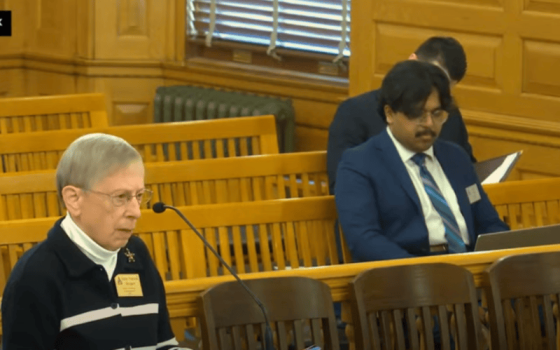
WASHINGTON -- An Obama administration announcement that new discretion will be exercised in whether to deport immigrants who do not have criminal records was hailed by advocates for immigrants and supporters of comprehensive reform.
The new policy announced in letters to senators Aug. 18 could mean some people facing deportation will be allowed to remain in the United States and get work permits, a development praised by Bishop John C. Wester of Salt Lake City, who heads the U.S. bishops' Committee on Migration.
"This could help keep families together and give hope to young persons who know only America as their home," he said in a statement.
Others also expressed support for the policy, but like Bishop Wester were quick to add that comprehensive immigration reform would be the best approach to fixing the nation's broken immigration policy.
Rep. Luis Gutierrez, D-Ill., one of the most visible congressional advocates for comprehensive immigration reform, noted that he has been a vocal critic of President Barack Obama over increased deportations during his administration.
"This is the Barack Obama I have been waiting for," he added, "and that Latino and immigrant voters helped put in office to fight for sensible immigration policies.
"Focusing scarce resources on deporting serious criminals, gang bangers and drug dealers and setting aside noncriminals with deep roots in the U.S. until Congress fixes our laws is the right thing to do and I am proud of the president and (Homeland Security Secretary Janet) Napolitano for standing up for a more rational approach to enforcing our current immigration laws."
Frank Sharry, executive director of America's Voice Education Fund, voiced skepticism about the ability of immigration agencies to adjust to a new approach, but added, "This announcement establishes a new level of accountability and clarity that should lead to safety and stability for thousands of American families whose lives currently are being turned upside down by deportation.
The praise came the same week -- and often in the same press releases -- in which many of the same organizations blasted the administration for expanding a program known as Secure Communities, which uses fingerprints gathered in jails and prisons to identify immigrants who are in the country illegally. Advocates for immigrants say the program leads to deportation for people who haven't been convicted of crimes.
Said Sharry: "Other reforms are sorely needed. The Secure Communities program remains fundamentally flawed and needs dramatic reforms to reverse the damage done to community policing; if not, the program should be terminated. Other administrative measures should also be taken. For example, spouses of U.S. citizens who are eligible for green cards and waivers of undocumented presence should be able to apply for those waivers in the U.S. -- without having to risk their families and their lives to do so."
Opponents of comprehensive immigration reform proposals were quick to criticize the policy. Arizona Gov. Jan Brewer said the plan "amounts to backdoor amnesty for hundreds of thousands -- if not millions -- of illegal aliens."
Rep. Lamar Smith, R-Texas, chairman of the House Judiciary Committee, said "the administration should enforce immigration laws, not look for ways to ignore them."
The new policy was spelled out in an Aug. 18 letter to Sen. Dick Durbin, D-Ill., and other senators who had been urging administrative action to help people facing deportation. In the letter, Napolitano said a review process would be conducted to decide which cases are a priority, in keeping with a June 17 memorandum from John Morton, director of Immigration and Customs Enforcement.
In a press release, Durbin's office said Morton's memo outlines a process under which criteria will be established to identify pending deportation cases where discretion could be exercised, allowing certain individuals to legally remain in the United States.
It said Morton's memo listed "positive factors" that might make someone a low priority for removal, including "individuals present in the U.S. since childhood (like DREAM Act students), minors, the elderly, pregnant and nursing women, victims of serious crimes, veterans and members of the armed services, and individuals with serious disabilities or health problems."
According to Durbin's office, Homeland Security will begin reviewing all 300,000 pending deportation cases individually to identify which ones meet the new criteria. People whose cases are closed will be allowed to apply for certain benefits including work permits.



